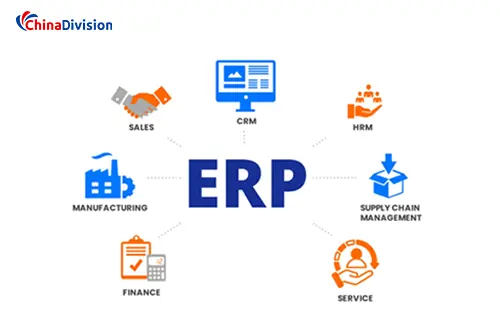How ERP Warehouse Management Systems Change Logistics
In the modern global supply chain, ERP warehouse management systems (Enterprise Resource Planning Warehouse Management Systems) have become the core driver of international warehousing, logistics, and transportation services. For cross-border B2B businesses and e-commerce sellers, effectively integrating warehouse management with enterprise resource planning is not only key to improving operational efficiency but also a strategic tool for reducing international logistics costs and optimizing the customer experience.
Table of Contents
In this article, we will explore how ERP-integrated warehouse management works, its advantages for international logistics, and how Chinadivision is leveraging this technology to empower global businesses.
What is an ERP warehouse management system?
An ERP warehouse management system is a crucial component of an enterprise resource planning (ERP) system. Designed specifically for warehousing operations, it integrates functions such as inventory management, order processing, logistics, and supply chain visibility. Unlike traditional standalone systems, ERP warehouse management seamlessly connects warehouse data with business processes such as finance, procurement, and sales through a unified platform, achieving end-to-end visibility of the global supply chain. ERP warehouse management systems (WMS) extend these capabilities by optimizing inventory tracking, order processing, and labor management within the warehouse.

Unlike standalone warehouse management systems (WMS), ERP WMS is part of a unified platform, ensuring real-time data flow between warehouse, sales, and finance teams. This integration is crucial for international logistics, where visibility across regions and time zones is crucial.
Core Functions of ERP Warehouse Management
Real-time Inventory Management: Automatically records inventory movements to avoid stockouts and overstocks.
Automated Order Processing: Integrates with e-commerce platforms or B2B systems to automatically sort, pack, and ship orders.
Data Visualization: Gain a clear overview of inventory, orders, returns, shipping, and other data.
Multi-Warehouse Collaboration: Supports unified management of multiple warehouses worldwide, improving cross-border operational efficiency.
ERP vs. Standalone WMS: Advantages and Disadvantages
Advantages of ERP Warehouse Management
Unified Data and Processes
ERP systems centralize cross-departmental data and eliminate data silos. For international logistics, this means real-time inventory visibility across warehouses worldwide, reducing stockouts and overstocking.
Cost-Effectiveness
Maintaining a single system (ERP) is less expensive than juggling ERP and standalone WMS licenses, training, and IT support.
Scalability
ERP WMS supports new markets and warehouses as your business grows without a complete system overhaul.
Benefits of a Professional WMS System
Advanced Warehouse Optimization
Standalone WMSs typically offer more in-depth functionality, such as dynamic slotting, wave picking, and labor forecasting—ideal for high-volume operations.
Customization
Specialized WMS solutions can be tailored to unique warehouse layouts or industry requirements (e.g., cold chain logistics).
Warehousing Specialization
Provides more granular warehouse operational functionality (e.g., wave planning, location optimization).
Pain Points and Solutions for ERP Management in Warehousing Logistics
Can an ERP WMS handle high-volume e-commerce orders?
Yes! Modern ERP WMS solutions include batch processing, automated sequencing, and integration with e-commerce platforms (e.g., Shopify, Amazon) to smoothly handle peak seasons.
Is an ERP WMS suitable for a mixed B2B and B2C model?
Of course. Our ERP WMS supports both bulk orders (B2B) and single-lot shipments (B2C) with flexible picking strategies and multi-channel fulfillment.
Why choose Chinadivision for your international logistics?
Smart warehousing: AI-driven inventory optimization across over 10 warehouses worldwide.
Fast fulfillment: 24-hour order processing and direct integration with carriers.
Cost savings: Reduce shipping costs by up to 30% through our carrier network.
Ready to streamline your global supply chain?
If you're a B2B business or e-commerce seller struggling with international warehouse management, Chinadivision can help.
In the era of globalized e-commerce, an ERP warehouse management system is no longer optional; it's essential for maintaining international competitiveness. As an experienced international warehousing, logistics, and transportation service provider, Chinadivision not only provides advanced ERP warehouse management technology but also offers a one-stop global supply chain solution, helping you focus on core business growth without worrying about logistics bottlenecks.
Whether you're a B2B business expanding into overseas markets or an e-commerce seller seeking to optimize cross-border logistics, Chinadivision can provide you with professional consulting and customized solutions. With ChinaDivision's professional services, you'll no longer have to worry about inventory disarray, order delays, or unclear data. Act now and let warehousing become the accelerator of your global expansion. Contact our expert team today for a free supply chain diagnosis and system demonstration to begin your journey to efficient global logistics. Whether you need assistance with international warehousing, freight forwarding, customs clearance, or last-mile delivery, ChinaDivision will solve your international logistics challenges.





